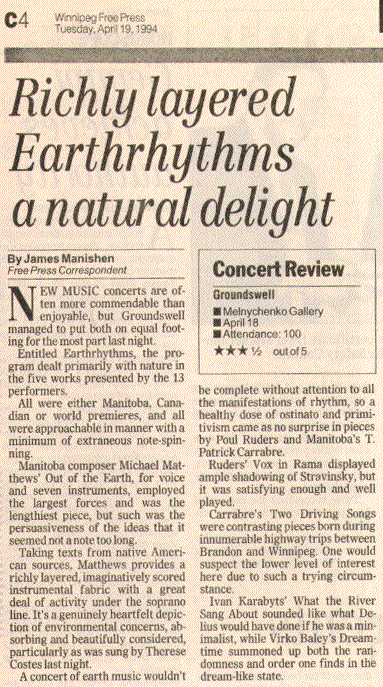Program Notes
This work is a setting of three texts from Native American sources. Each speaks in its own way of our relationship to nature. I was drawn to these texts not only for their inherent beauty but also because of my concern for our society’s loss of this relationship and of the devastating and possibly irreparable damage which we are doing to our home planet. These are however songs not of despair but of joy, singing and celebrating nature, and are one of the outcomes of a recent personal experience. During July of 1992 I had the good fortune to be involved in a CBC radio project which involved taking the train from Winnipeg to Churchill and writing music for a program commemorating Glenn Gould and his famous radio broadcast “The Idea of North”. This train trip and my experiences of the landscape of Churchill and northern Manitoba, especially time spent standing on the shore of Hudson Bay watching the ice breaking up, left me with a deep sense of how precious our wilderness is, and how crucial it is to our spiritual wholeness.
Out of the Earth was commissioned by Vancouver New Music Society with financial assistance from the Manitoba Arts Council. The world premier was given at the Vancouver East Cultural Centre on March 21, 1993; the performers were:
Therese Costes, soprano
David Owen, oboe/English horn
Lori Freedman, bass clarinet/clarinet
Lauri Lyster, percussion
James Clapperton, piano
Victor Costanzi, violin
Susan Round, cello
David Brown, double bass
Owen Underhill, conductor
The titles of the individual movements should be listed in the program, and, if possible, the texts should be included in the program notes.
Rain Song (Papago)
Close to the west the great ocean is singing.
The waves are rolling toward me, covered with many clouds.
Even here I catch the sound.
The earth is shaking beneath me and I hear the deep rumbling.
I Sing for the Animals (Teton Sioux)
Out of the earth
I sing for them,
A Horse nation
I sing for them.
Out of the earth
I sing for them,
The animals
I sing for them.
The Song of the Stars (Algonquin)
We are the stars which sing,
We sing with our light;
We are the birds of fire,
We fly over the sky.
Our light is a voice;
We make a road for spirits,
For the spirits to pass over.
Among us are three hunters
Who chase a bear;
There never was a time
When they were not hunting.
We look down on the mountains.
This is the Song of the Stars.
